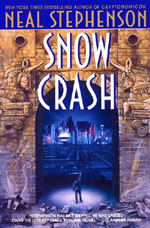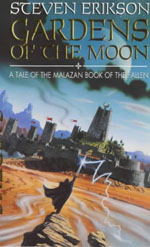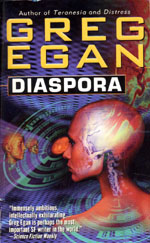 Neal Stephenson’s career to this point can be split into roughly two halves: In the first half, he possessed a vibrant style of satirical SF which – while still rough around the edges – developed quickly with laser-like prose, memorable casts of characters, high octane plots, technical savvy, and vividly imagined settings. In the second half of his career, all of these things have been perfected – but Stephenson also developed a tendency towards bloat (although the quality of his prose tends to keep you engaged) and an unfortunate habit of writing books without ends (although the plots-without-resolution remain high octane right up until the very last page).
Neal Stephenson’s career to this point can be split into roughly two halves: In the first half, he possessed a vibrant style of satirical SF which – while still rough around the edges – developed quickly with laser-like prose, memorable casts of characters, high octane plots, technical savvy, and vividly imagined settings. In the second half of his career, all of these things have been perfected – but Stephenson also developed a tendency towards bloat (although the quality of his prose tends to keep you engaged) and an unfortunate habit of writing books without ends (although the plots-without-resolution remain high octane right up until the very last page).
And poised right at the pinnacle between these two halves – possessing all of their strengths and none of their shortcomings – is Snow Crash, which is almost certainly Stephenson’s finest work to date.
Saying that Snow Crash is a fantastic novel – a jewel whose facets have been cut with breathtaking precision – is easy enough. Trying to explain what Snow Crash is, on the other hand, is a bit more difficult.
On this reading of Snow Crash (this is the second time I’ve read it), I found myself being strongly reminded of Philip K. Dick. It took me awhile to figure out why, but once I did it was like a lightbulb going off above my head: Snow Crash is satire.
But, more than that, Snow Crash is a satire on three completely different levels: First, and most obviously, it’s a satire of the cyberpunk genre as popularized by William Gibson during the 1980’s. Second, it’s a satire of the modern world. Third, it’s a satire of a future world.
It is this last, and most remarkable, accomplishment that reminds me so strongly of Dickian classics like Do Androids Dream of Electric Sheep? Like Dick, Stephenson not only creates a fully-realized future, he presents that future in a stylized fashion. At first glance, the result seems surreal. But a closer look reveals a reality made all the more tangible and believable as a result of the uniquely skewed point of view.
People talk about the fact that Heinlein wrote science fiction stories as if they were just fiction stories written by authors in the future. I would argue that Dick took this to the next level by writing his stories as if they were written by future authors with stylistic flair, and that Stephenson has taken this to yet another level by layering the technique.
And looking at Snow Crash through this new lens, the opening sequence of the novel – which had previously seemed to me, despite its hilarious effectiveness, to be oddly out of synch with the rest of the novel – suddenly came into sharp focus. This opening sequence is nothing more than a pizza delivery, but Stephenson presents it as a matter of life-and-death – neatly satirizing the self-important style of classical cyberpunk tales: “When they gave him the job, they gave him a gun. The Deliverator never deals in cash, but someone might come after him anyway – might want his car, or his cargo.”
But if you take a closer look, the sequence is satirizing life in the modern world as much as it is the stylings of Gibsonesque cyberpunk: “Just a single principle: The Deliverator stands tall, your pie in thirty minutes or you can have it free, shoot the driver, take his car, file a class-action suit. The Deliverator has never delivered a pizza in more than twenty-one minutes. Oh, they used to argue over times, many corporate driver-years lost to it: homeowners, red-faced and sweaty with their own lies, stinking of Old Spice and job-related stress, standing in their glowing yellow doorways brandishing their Seikos and waving at the clock over the kitchen sink, I swear, can’t you guys tell time?
“Didn’t happen anymore. Pizza delivery is a major industry. A managed industry. People went to CosaNostra Pizza University for four years just to learn it. And they had studied this problem. Graphed the frequency of door delivery-time disputes. Wired the early Deliverators to record, then analyze, the debating tactics, the voice-stress histograms, the distinctive grammatical structures employed by white middle-class Type A Burbclave occupants who against all logic had decided that this was the place to take their personal Custerian stand against all that was stale and deadening in their lives: they were going to lie, or delude themselves, about pizza; no, they deserved a free pizza along with their life, liberty, and pursuit of whatever, it was fucking inalienable.”
And, of course, beneath it all, Stephenson is laying down the first building blocks in the foundation of his setting.
The whole, ten-page sequence is a tour de force of talent. It is the work of a writer who has mastered his craft, and with supreme confidence proceeds to suck you into his story and his world.
And it’s just the beginning, because this superb layering of satire and world-building is just one of the most basic delights the novel has to offer.
Snow Crash also reminds me of Kenneth Hite. Hite writes a column called “Suppressed Transmissions” for Pyramid, an on-line magazine published by Steve Jackson Games. Every two weeks Hite mixes up a potent brew of Kabbalism, tarot symbolism, grail mythology, Nazi mysticism, Illuminati conspiracy, Tesla science, and a dozen other types of secret history – serving up the result as an idea mine for roleplayers everywhere.
In similar fashion, the central plot of Snow Crash hangs upon Sumerian myth cycles, comparative linguistics, memetic theory, and cyberpunk tropism. I draw a direct line from H.P. Lovecraft and Charles Forte, through Robert Anton Wilson, and end up with Stephenson and Hite.
Snow Crash is also, arguably, the moment of crystallization for the post-cyberpunk genre. It was the first massively popular work to break away from the narrow bandwidth the cyberpunk genre had possessed since Gibson first crystallized it in 1984 with Neuromancer, and demonstrated that the genre was a form which was not necessarily tied to a specific content of plot or theme. On top of that, Stephenson shed many of the technological trappings of cyberpunk that had more to do with science fantasy than science fiction, and rooted those that remained in much firmer soil. (Stephenson’s Metaverse, for example, is a believable extrapolation, whereas Gibson’s cyberspace doesn’t rise above the level of metaphorical handwaving.)
(Antecedents, of course, exist for Snow Crash’s moment of crystallization. For one example, check out my reaction to Lawrence Watt-Evans’ excellent Nightside City. Similarly, Gibson’s crystallization of the cyberpunk genre as a whole had a number of antecedents.)
And, last but not least, despite a complex setting resting upon the monomolecular cutting edge of science fiction, Snow Crash is also written as a mainstream technothriller. Stephenson never expects his readers to be familiar with the tropes of science fiction, but instead explains every extrapolation from the modern world. It is a further testament of Stephenson’s mastery that these descriptions never become tedious to the hardcore fan, instead existing as an entertaining and stylistic patter that never slow the book down. For example: “The computer is a featureless black wedge. It does not have a power cord, but there is a narrow translucent plastic tube emerging from a hatch on the rear, spiraling across the cargo pallet and the floor, and plugged into a crudely installed fiber-optics cable. The cable is carrying a lot of information back and forth between Hiro’s computer and the rest of the world. In order to transmit the same amount of information on paper, they would have to arrange for a 747 cargo freighter packed with telephone books and encyclopedias to power-dive into their unit every couple of minutes, forever.”
So what is Snow Crash? I dunno. It’s identity lies somewhere within a gestalt; it’s a masterpiece that can be discussed in facets, but never as a whole.
And it’s all bundled up in a tight little package with all of Stephenson’s remarkable gifts as a writer: Masterful and compelling plotting, a remarkably detailed world, and a cast of characters drawn with enough breadth and depth to make most authors drop their jaws with jealousy. And then there’s Stephenson’s prose, which can be relished as a main course all by itself. You can see some examples of it above, but the entire book is peppered with memorable passages and quotable lines. Every page seems to hum with a distinctive beat and rhythm, propelling you from one chapter to the next in a compulsive, addictive reading experience.
This isn’t the best SF novel of the past fifteen years. But it’s definitely in the top ten.
GRADE: A+
Neal Stephenson
Published: 1992
Publisher: Bantam Spectra
Cover Price: $7.99
ISBN: 0-553-56261-4
Buy Now!













